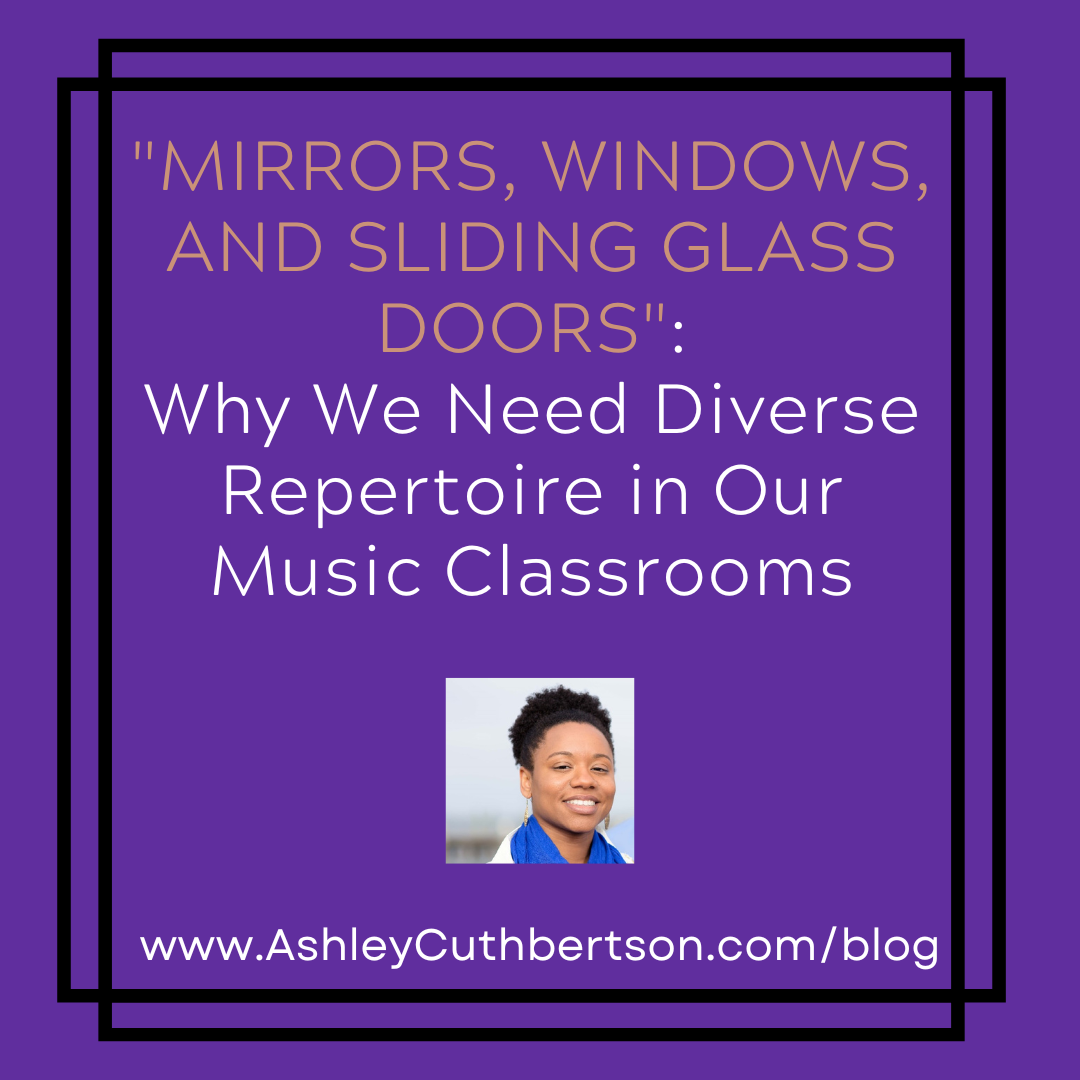Listen to this blog post by clicking the player below!
In Dr. Rudine Sims-Bishop’s 1990 article “Mirrors, Windows, and Sliding Glass Doors,” she presents a useful metaphor for the importance of diverse children’s books when she says that “books are sometimes windows, offering views of worlds that may be real or imagined, familiar or strange… a window can also be a mirror… we can see our own lives and experiences as part of the larger human experience.”
While Dr. Sims-Bishop was referring to books, as music educators, there are many parallels between books and repertoire.
Mirrors
Diversity matters in our repertoire choices because we live in a global society and our world is becoming increasingly more diverse. Every child deserves the ability to see “mirrors” of themselves in our music repertoire choices because identity and representation matter. Seeing reflections of your own identity serve to affirm your lived experiences as valid, as well as give examples for what more could be possible beyond your immediate experiences.
Identity is multifaceted: none of us are any one “thing.” While the term ‘diversity’ often is used in reference to ethnic and racial differences, it’s important to note that diversity also refers to ability, gender expression, and more.
In our general music classrooms, we must do more than simply tell students that they belong, we must demonstrate it. Our repertoire choices can serve as a powerful means to demonstrate to all of our students, but especially our marginalized and minoritized students, that they belong by selecting repertoire that affirms their identities and experiences.
We must take care to avoid and remove any and all repertoire that presents marginalized and minoritized identities in negative and/or stereotypical ways. Whether we state it explicitly or not, the use of harmful, negative, and/or stereotypical repertoire in regards to our marginalized and minoritized students communicates to them that they are of less value.
General music educators must be aware and intentional about the reflections presented through their repertoire choices to ensure that they provide for positive, joyful, and affirming musical experiences for all music students.
Windows
Additionally, it is important that we provide our music students with “windows” through our repertoire choices. Students need to learn about those who are different from them so that they can understand the beauty in the diversity of our global society, as well as understand their place as just one member of our global community.
Developing understandings about others who are different (not better or worse, just different) is a key factor to creating a just society.
In our general music rooms, we can help students develop these understandings by utilizing repertoire to provide windows into other cultures, histories, abilities, familial structures, and ways of being not just as a means for developing musicianship skills, but also as a means to help students advance their understandings of the world around them which is a critical piece of all educational endeavors.
For students for whom there are numerous “mirrors” and reflections of their own identity, providing windows becomes especially important.
When one only sees themselves reflected, they develop an inflated sense of their identity as being superior. Cultivating a diverse musical classroom through the use of diverse repertoire helps to counteract this by providing students with a more full understanding of society and the world.
Sliding Glass Doors
As we seek a more just world, in our music rooms we can also provide “sliding glass doors” through our repertoire choices. This not only allows our young musicians to learn about those who are different from them, but it also allows them to step into another’s experiences and develop empathy.
Moving beyond just learning about someone or something new in order to step into another’s experiences often requires us to engage in socio-political themes such as power, oppression, and equity.
Because music is such a natural and powerful force for expression and connection, music is a beautiful way to help our young musicians explore socio-political themes. Even in our music classrooms, we must attend to the development of a lens of discernment for our students. One of our ultimate goals is to help our students become well-informed, compassionate, empathetic, and productive members of our society regardless of how they continue to engage with music in their future.
Music is for everyone
As music educators, we must be intentional in our repertoire choices to ensure that we are providing “mirrors, windows, and sliding glass doors” for all of our students.
Additionally, we must take care to position our repertoire choices to help our students not only gain valuable musicianship skills, but to also gain valuable skills as compassionate and well-informed members of our society.
What are your thoughts about utilizing diverse repertoire in your music classroom?
I would love to hear your thoughts about utilizing diverse repertoire in your music classroom!
Share below or share on social media and tag me: I’m @ACuthbertson10 on Twitter & Instagram, and @ACuthbertsonConsulting on Facebook.
Also, let me know what you think of this post! If you haven’t already, be sure to sign up for my email newsletter where I send blog posts and other music ed resources and tips each week to help support you ensure all of your young musicians thrive.
Until next time,
Ashley
P.S. Did you like this post? Use the buttons below to share it with a music teacher friend!
